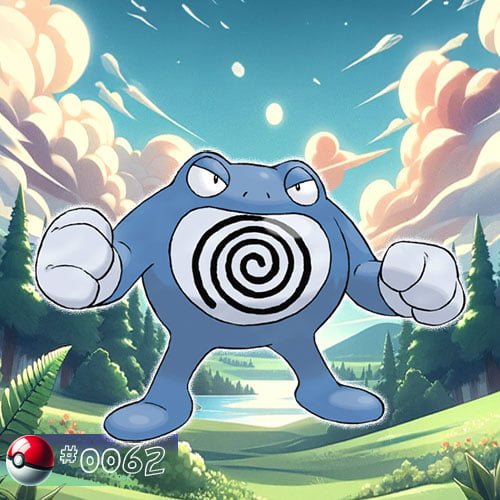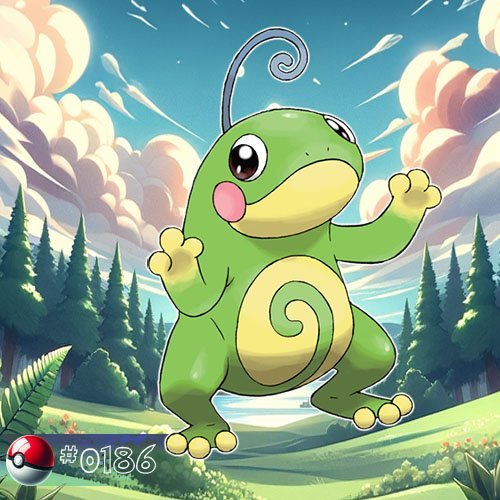Poliwrath
Poliwrath is a Water/Fighting-type Pokémon, known for its amphibious appearance. As a dual type Pokémon, Poliwrath has access to a variety of Water and Fighting-type moves, making it a versatile and formidable battler.
Biology
Physical Characteristics
Poliwrath is a Pokémon with distinct physical characteristics.
Poliwrath has a large, robust, and muscular body with a humanoid shape. Its body is predominantly blue, and it has a white belly with swirl patterns. Poliwrath has webbed hands and feet, adapted for aquatic movement.
Poliwrath has a round head with a distinctive crown-like structure. It has large, oval-shaped eyes with black irises. Poliwrath’s mouth is usually closed, and it lacks visible teeth.
It has powerful arms with large, red, circular fists. Poliwrath’s legs are muscular and end in webbed feet, emphasizing its amphibious nature. Poliwrath has characteristic swirl patterns on its stomach, adding to its unique visual appeal.
Poliwrath’s size can vary, but it generally stands at around 4 feet 3 inches (1.3 meters) tall. It weighs approximately 119 pounds (54 kilograms). As a Water/Fighting type, Poliwrath exhibits traits associated with both elements, such as proficiency in Water and Fighting-type moves.
These physical characteristics contribute to Poliwrath’s overall design, highlighting its amphibious nature and its prowess in battles, particularly in aquatic environments.
Behaviour
Poliwrath’s behavior is influenced by its Water/Fighting-type and its amphibious nature. Here are some details about its behavior.
Poliwrath is often found near bodies of water, including lakes, rivers, and ponds, as it prefers aquatic environments.
Poliwrath is known to be protective of its territory and those it cares about. It may exhibit guardian-like behavior, especially in areas with water. With its Fighting-type characteristics, Poliwrath is skilled in various fighting techniques. It can deliver powerful punches and kicks during battles.
Poliwrath may form social bonds with other Pokémon, especially those within its evolutionary line like Poliwag and Poliwhirl. These social connections contribute to its sense of community.
Poliwrath’s ability to move both on land and in water showcases its adaptability. It can navigate different terrains with ease. Poliwrath, like its pre-evolutions, may be sensitive to the cleanliness of its aquatic habitat. It thrives in well-maintained water environments.
While powerful in battles, Poliwrath is not inherently aggressive. It may display a calm demeanor outside of combat situations. Poliwrath can be trained effectively due to its intelligence and willingness to learn. Trainers can harness its natural fighting instincts for various tasks.
Understanding Poliwrath’s behavior involves recognizing its dual nature as a Water and Fighting-type Pokémon, acknowledging its adaptability, and appreciating its role as a guardian in its habitat.
Evolution
Here are the details about the evolution of Poliwrath.
Poliwag evolves into Poliwhirl when it reaches a certain level of experience and familiarity with its Trainer (level 25). During this evolution, Poliwag undergoes a noticeable transformation, gaining limbs and developing into a more amphibious form.
The evolution from Poliwhirl to Poliwrath is triggered by exposure to a Water Stone. The Water Stone is a special evolutionary item that induces the evolution process in certain Water-type Pokémon, including Poliwhirl. When Poliwhirl comes into contact with the Water Stone, it undergoes a rapid transformation. The Water Stone releases energy that is absorbed by Poliwhirl, causing it to evolve.
The evolution results in significant physical changes to Poliwhirl’s appearance. Poliwrath gains additional features, such as larger and more developed muscles, enhanced limbs, and a change in its overall body structure. Poliwrath retains its Water typing from Poliwhirl but gains an additional Fighting typing. This dual typing influences its abilities and move pool.
The evolution into Poliwrath often signifies an increase in strength and combat abilities. Poliwrath becomes a formidable Water/Fighting-type Pokémon. Poliwrath learns and masters various Fighting-type moves, reflecting its new dual typing. It retains access to Water-type moves, showcasing a combination of both elements in its battle strategy. Poliwrath’s evolution enhances its versatility in battles, allowing it to employ a wider range of techniques and tactics.
Understanding the evolution of Poliwrath from Poliwhirl involves recognizing the role of the Water Stone and appreciating the transformation that occurs, both in terms of appearance and battling capabilities.
Appearances
Anime Main Appearances
In the episode “Charizard Chills” Tad’s Poliwrath defeated Pikachu and Charizard but was later defeated in a rematch. Andreas’s Poliwrath battled Misty‘s Poliwhirl in a Seaking Catching contest and lost.
In the episode ”Machoke, Machoke Man” Chuck used Poliwrath in a Gym battle against Ash, defeating Pikachu but later losing to Bayleef. Delaney’s Poliwrath had a winning streak, drawing attention from Team Rocket in “Outrageous Fortunes”.
The Revengers used a Poliwrath to assist Viren in a Battle Royal in the episode “A Young Royal Flame Ignites”. James utilized a Poliwrath against Ash and Goh in “Kicking It from Here Into Tomorrow”, but it was ultimately defeated.
Anime Minor Appearances
Poliwrath first appeared in the episode “The Punchy Pokémon” competing in the P1 Grand Prix. In “The Battling Eevee Brothers!”, a Poliwrath evolved from a Poliwhirl during the evolution party. It was part of the cast in “Lights, Camera, Quack-tion” and competed in a Sumo Conference in “Ring Masters”.
Other appearances include the Extreme Pokémon Race and the Pokémon Triathlon in “One Team, Two Team, Red Team, Blue Team!”. A Poliwrath battled a wild Riolu in “Caring for a Mystery!” and appeared in a flashback or fantasy in “The Forest Champion!” and “This Could be the Start of Something Big!”.
Multiple Poliwrath appeared in the episodes ”The Power of One” (disturbed by Lawrence III) and ”A Six Pack Attack!”.
A Trainer’s Poliwrath appeared also in the following epsodes ”Pop Goes The Sneasel”, ”Battle Royal 151!” (participated in the Battle Royal preliminary round of the Manalo Conference) and ”A Festival Reunion!”.
Manga Appearances
Pokémon Adventures
In the episode “Buzz Off, Electabuzz!,” Red’s Poliwhirl evolved into Poliwrath to save him from drowning. This evolution was explained in the Yellow arc, introducing four unlimited-use Evolution stones.
Gold fantasized about Politoed’s evolution in “Ampharos Amore.” Chuck, Blue’s master, owns a Poliwrath seen in “Scrappy Skarmory,” using Dynamic Punch with Primeape to locate Suicune.
Magnus’s Poliwrath first appeared in “Attaway, Aipom!”.
A Trainer’s Poliwrath appeared in “Weavile Wobbles But It Won’t Fall Down” and “Truth and the Mastermind Behind Team Skull.”
Pokémon Pocket Monsters
Green’s Poliwrath made its debut in the episode “The Big Battle In The Viridian Forest!!.” Another Poliwrath appeared in “Part-Time Job At The Swimming Pool!!”.
One of Giovanni’s Poliwhirl evolved into a Poliwrath in “The Thrill of a Perfect Score, Big Rampage at the Amusement Park!” to confront Red, Clefairy, and Pikachu at Giovanni’s amusement park.
Professor Oak also owns a Poliwrath, introduced in “Save the Pokémon Zoo!!”.
Poliwrath also appeares in the following Pokémon manga:
Pocket Monsters DP– in the sixteenth chapter of the Pocket Monsters DP manga, PMDP16.
Pokémon Battle Frontier – in the episode ”Aim for the Top!”.
Pokémon Gold & Silver: The Golden Boys – in the episodes ”The Secret Of The Fighting Type Pokémon”(owned by Chuck) and ”Let’s Fight For The Future!!” (in a flashback).
Pokémon Gotta Catch ‘Em All – in the episodes GDZ36 and GDZ51.
Pokémon Journeys: The Series – in the episodes ”Kicking It from Here into Tomorrow!” (used by Team Rocket) and ” Caring for a Mystery!”.
Game data
Stats
Location
| Game version | Location |
|---|---|
| Pokémon Red and Pokémon Blue | Evolve Poliwhirl |
| Pokémon Yellow | Evolve Poliwhirl |
| Pokémon Gold and Pokémon Silver | Evolve Poliwhirl |
| Pokémon Crystal | Evolve Poliwhirl |
| Pokémon Ruby and Pokémon Sapphire | Trade |
| Pokémon FireRed and Pokémon LeafGreen | Evolve Poliwhirl |
| Pokémon Emerald | Trade |
| Pokémon Colosseum | Trade |
| Pokémon XD | Citadark Isle |
| Pokémon Diamond and Pokémon Pearl | Evolve Poliwhirl |
| Pokémon Platinum | Evolve Poliwhirl |
| Pokémon HeartGold and Pokémon SoulSilver | Evolve Poliwhirl |
| Pokémon Black and Pokémon White | Giant Chasm, Wellspring Cave, Challenger's Cave, Victory Road |
| Pokémon Black 2 and Pokémon White 2 | Route 23, Giant Chasm, Wellspring Cave, Victory Road, Clay Tunnel, Relic Passage |
| Pokémon X and Pokémon Y | Victory Road |
| Pokémon Omega Ruby and Pokémon Alpha Sapphire | Trade |
| Pokémon Sun and Pokémon Moon | Malie Garden |
| Pokémon Ultra Sun and Pokémon Ultra Moon | Malie Garden |
| Pokémon: Let's Go, Pikachu! and Pokémon: Let's Go, Eevee! | Cerulean Cave |
| Pokémon Sword and Pokémon Shield | Evolve Poliwhirl |
| Pokémon Brilliant Diamond and Pokémon Shining Pearl | Evolve Poliwhirl |
| Legends Arceus | Unobtainable |
| Pokémon Scarlet and Pokémon Violet | Trade |
Poliwrath's origin name
English: Poliwrath’s English name, “Poliwrath,” is a combination of “polliwog” (a term for a tadpole) and “wrath” (indicating its powerful and formidable nature).
Japanese (ニョロボン – Nyorobon): The Japanese name “Nyorobon” is a combination of “蛙” (nyoro), meaning frog, and “腹” (bon), meaning abdomen. This reflects Poliwrath’s frog-like appearance.
German: In German, Poliwrath is called “Quappo,” combining “Quappe” (tadpole) and possibly “Kraft” (power), reflecting its development from a tadpole to a powerful Pokémon.
French: The French name is “Tartard,” combining “têtard” (tadpole) and possibly “tard” (late), indicating its evolution beyond the tadpole stage.
Spanish: In Spanish, Poliwrath is known as “Poliwrath,” maintaining the English name.
Italian: The Italian name is “Poliwrath,” consistent with the English name.
Korean (개굴반장 – Gaegulbanjang): The Korean name “개굴반장” (Gaegulbanjang) combines “개굴” (Gaegul), meaning croak, and “반장” (Banjang), meaning leader. This highlights Poliwrath’s leadership and its croaking sound.
Chinese (蚊香蝌蚪 – Wénxiāng Kēdǒu): In Chinese, Poliwrath is known as “蚊香蝌蚪” (Wénxiāng Kēdǒu), which translates to “Mosquito Coil Tadpole.” The name might refer to its coiled appearance and its origin as a tadpole.
These names offer insights into cultural and linguistic nuances, providing a diverse understanding of how Poliwrath is perceived across different regions.






